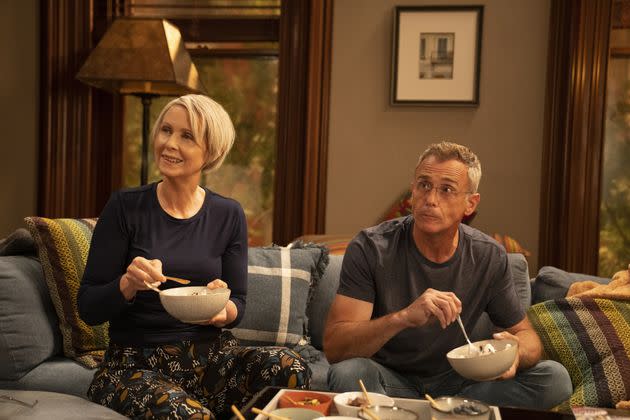Steve's Hearing Loss On 'And Just Like That' Is Inspired By Actor Who Plays Him
The creative team behind HBO Max’s “Sex and the City” revival have made a distinct effort to reflect the realities of aging. For actor David Eigenberg, it’s a case of art imitating life.
Julie Rottenberg and Elisa Zuritsky, two screenwriters on HBO Max’s “And Just Like That...,” told Vanity Fair this week that they incorporated Eigenberg’s real-life experience with hearing loss into his character, Steve Brady. In the show’s premiere episode, “Hello It’s Me,” Steve explains that he recently got hearing aids ― a plot point that’s further developed in episode seven, “Sex and the Widow,” which aired this week.
“When [showrunner] Michael Patrick [King] reconnected with David Eigenberg about the show, the very first thing that David said was, ‘I got hearing aids.’ It was literally what he led with,” Zuritsky explained.
“Everyone on the show, every single person, loves David Eigenberg as a human being,” she continued. “We love him as an actor. We love Steve. We are really invested in the Steve-ness of him. He’s so full of life, and the Steves out there are good guys.”

Compared to the original “Sex and the City,” Steve’s presence on “And Just Like That...” has been considerably diminished as his wife, Miranda Hobbes (played by Cynthia Nixon), is exploring her sexuality and showing signs of alcoholism.
Though Steve has thus far fared better on the new series than another one of its beloved male characters, his lack of screen time hasn’t gone unnoticed by fans and critics. In an article for The Cut published earlier this week, journalist Danielle Cohen argued that the show’s writers “[do] not seem too interested in exploring how that very kind and patient young Steve has matured,” later proclaiming, “This is not the life Steve deserves!”
In her chat with Vanity Fair, Rottenberg suggested that Miranda’s journey on the series ― at least as it pertains to her relationship with Steve ― is intended to represent “the reevaluations and transitions in life.”
“Grown couples grow apart, and people come to epiphanies about what their spouse is or isn’t fulfilling for them,” she said. “Miranda’s story was very representative of a certain path that a lot of women find themselves on.”
“Even beloved people have crises,” Zuritsky added. “Even moral, generally wonderful people make choices that aren’t necessarily admirable or virtuous. But they do them anyway because they’re going through something, or they’re working through a crisis.”
This article originally appeared on HuffPost and has been updated.




